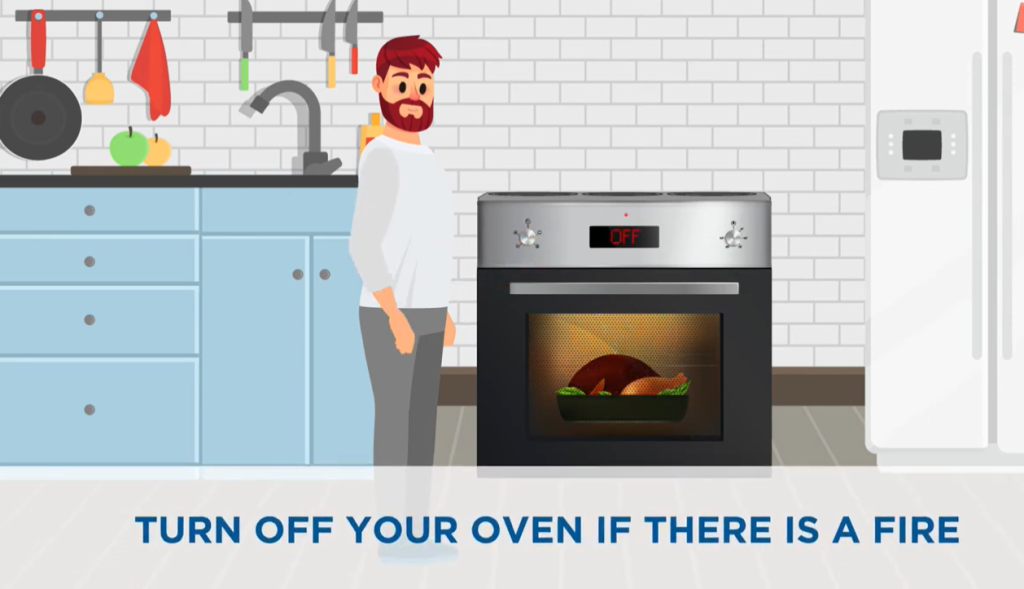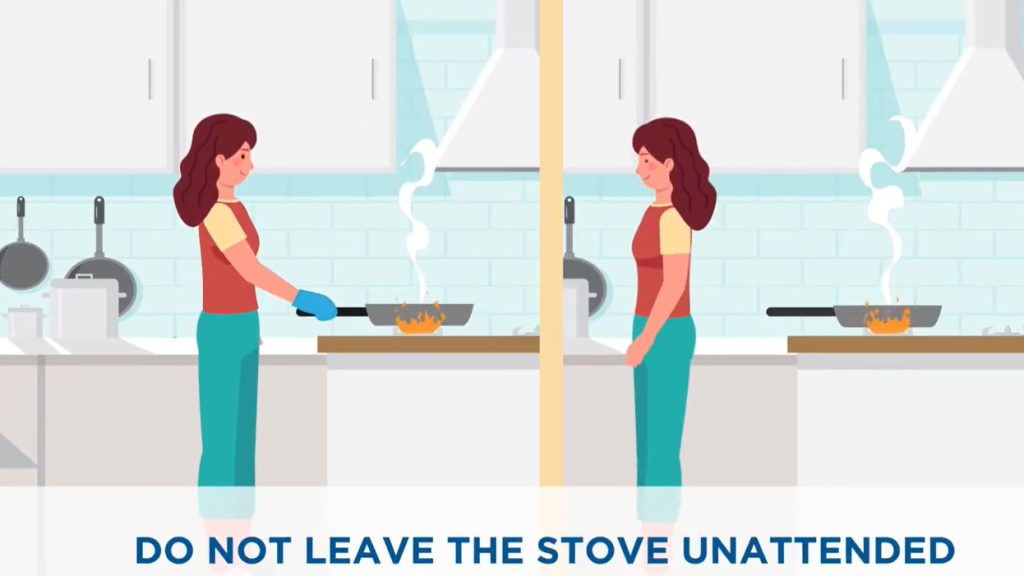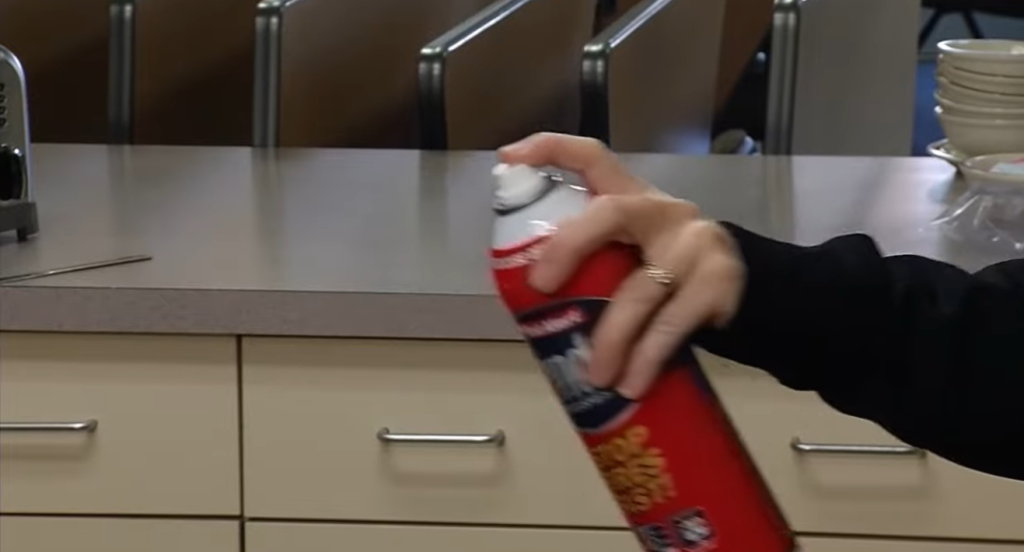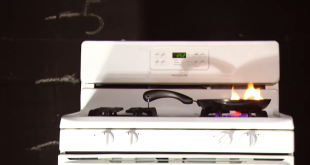In the event of a kitchen fire, smother the flames by covering with a lid and turning off the heat. In case of grease fires, use a fire extinguisher or baking soda, and never use water.
Kitchen fire safety is crucial for preventing accidents and protecting your home and loved ones. With the potential for open flames, hot surfaces, and flammable materials, the kitchen can be a prime location for fires to occur. By implementing the proper safety measures and being prepared for emergencies, you can minimize the risk of kitchen fires and ensure a safe cooking environment.
We will explore essential kitchen fire safety tips to help you prevent fires, respond to emergencies, and keep your kitchen and household safe.
Kitchen Fire Safety Basics
Kitchen fire safety is crucial for the well-being of your home and family. With the fast-paced environment and various heat sources present in a kitchen, it’s essential to be prepared for potential fire hazards. Understanding basic kitchen fire safety practices can help prevent disasters and keep your kitchen a safe place. From recognizing common causes of kitchen fires to implementing preventive measures, here’s everything you need to know about kitchen fire safety basics.
Importance Of Kitchen Fire Safety
It’s essential to prioritize kitchen fire safety due to the potential severity of kitchen fires. In the event of a fire, the kitchen poses a high risk for rapid fire spread and toxic smoke inhalation. Understanding the importance of kitchen fire safety can help to mitigate these risks and ensure the protection of your home and loved ones.
Understanding Common Causes Of Kitchen Fires
Kitchen fires can result from various causes, making it vital to be aware of the common culprits. Whether it’s unattended cooking, grease buildup, or electrical malfunctions, recognizing these common causes is the first step in preventing kitchen fires. By understanding the common causes, you can take proactive measures to minimize the risk of fire occurrence in your kitchen.

Essential Fire Prevention Measures
Preventing kitchen fires is essential for the safety of your home and family. By implementing key fire prevention measures, you can significantly reduce the risk of kitchen fires. Let’s explore some essential fire prevention measures that are crucial for maintaining a safe kitchen environment.
Proper Maintenance Of Appliances
Regular maintenance of kitchen appliances is critical for fire prevention. Faulty appliances can lead to electrical fires, so it’s important to ensure they are well-maintained.
- Regularly clean and inspect your stovetop, oven, and exhaust hood to prevent grease buildup.
- Check the condition of electrical cords and plugs for any signs of damage, and replace them if necessary.
- Keep flammable materials, such as kitchen towels and curtains, away from hot surfaces like stovetops and ovens.
Importance Of Smoke Alarms
Smoke alarms are crucial for early detection of kitchen fires, providing vital time for evacuation and fire suppression efforts. It’s essential to prioritize the installation and maintenance of smoke alarms in the kitchen area.
- Install smoke alarms in close proximity to the kitchen, but ensure they are placed away from cooking fumes to minimize false alarms.
- Test smoke alarms monthly to ensure they are functioning properly, and replace batteries at least once a year.
- Invest in interconnected smoke alarms that trigger all alarms in the home when one detects smoke, ensuring everyone is alerted to the potential danger.
Practical Kitchen Fire Safety Tips
Practicing fire safety in the kitchen is crucial to prevent accidents and to ensure a safe cooking environment. By following a few practical guidelines, you can significantly reduce the risk of kitchen fires. Let’s explore some essential kitchen fire safety tips to keep in mind.
Safe Cooking Practices
When cooking, it’s essential to follow safe cooking practices to avoid potential fire hazards. Always stay in the kitchen while frying, grilling, or broiling food. If you must leave, turn off the stove. Keep flammable items such as oven mitts, wooden utensils, and paper towels away from the stovetop to prevent them from catching fire. Keep a close eye on food while it’s cooking and use a timer to remind you when food is done, to avoid overcooking, which can lead to fires. Moreover, keep a fire extinguisher in the kitchen and ensure that you know how to use it in case of an emergency.
Proper Handling Of Grease And Oils
Improper handling of grease and oils can significantly increase the risk of kitchen fires. When using oils for cooking, always heat them slowly at a lower temperature. This can help prevent them from overheating and igniting. After use, allow the oils to cool before disposing of them in a metal container. Avoid pouring hot grease down the drain as it can lead to grease buildup and potential fire hazards. Regularly clean the stovetop, oven, and exhaust hood to remove grease residue, which can easily catch fire during cooking.

Fire Emergency Preparedness
Fire emergencies in the kitchen can escalate rapidly, making it crucial to be prepared. Understanding fire emergency preparedness is vital for ensuring the safety of everyone in your household and minimizing potential damage. By adopting proactive measures, you can create a secure environment and know how to react swiftly in case of a fire.
Creating An Evacuation Plan
In the event of a kitchen fire, having a well-defined evacuation plan is essential for ensuring the safety of your family.
- Identify two primary evacuation routes from your kitchen.
- Ensure all family members are aware of the escape routes.
- Designate a meeting point outside the house to gather once everyone has evacuated.
- Regularly practice the evacuation plan with your family to ensure everyone is familiar with the procedure.
Steps To Extinguish A Small Kitchen Fire
Being able to effectively extinguish a small kitchen fire can prevent it from spreading and causing extensive damage.
- If the fire is contained in a pot or pan, immediately cover it with a metal lid or a larger pan to smother the flames.
- Turn off the heat source and avoid moving the pan to prevent the fire from spreading.
- If it’s safe to do so and the fire is small, use a fire extinguisher specifically designed for kitchen fires.
- If the fire continues to grow, evacuate the area immediately and call emergency services.
Ensuring A Safe Environment
Kitchen fire safety is paramount to maintaining a safe environment in any home. Fires in the kitchen can occur due to various reasons, and it’s essential to take preventive measures to minimize the risk. By implementing proper safety protocols and being prepared for potential emergencies, you can create a secure and risk-free space for cooking and food preparation.
Proper Storage Of Flammable Items
Storing flammable items in the kitchen requires careful consideration. It’s crucial to keep flammable items such as cooking oils, cooking sprays, and cleaning agents away from heat sources and open flames. These items should be stored in a cool, dry place and away from the stove or other cooking appliances. Additionally, utilize airtight containers for oils and other flammable liquids to reduce the risk of accidental spillage and subsequent fire hazards.
Importance Of Having A Fire Extinguisher
Having a fire extinguisher readily accessible in the kitchen is a pivotal safety measure. In the event of a small or incipient fire, a fire extinguisher can help contain and extinguish the flames before they escalate. It’s essential to ensure that the fire extinguisher is properly maintained and easily accessible near the cooking area. Familiarize yourself with the operation of the extinguisher and conduct regular checks to verify its operational status.
Educating Family Members
When it comes to kitchen fire safety, one of the most crucial aspects is educating family members. By teaching children fire safety measures and involving the whole family in safety practices, you can mitigate the risk of kitchen fires and ensure a safe environment for everyone.
Teaching Children Fire Safety Measures
Educating children about fire safety is essential for their protection in the kitchen. Here are some important fire safety measures to teach them:
- Never play with matches, lighters, or any kind of fire source.
- Stay away from the stove and oven when they are in use.
- Know how to use a fire extinguisher and when to call for help.
Involving The Whole Family In Safety Practices
Involving the entire family in fire safety practices creates a united front against kitchen fires. Here are some ways to engage the family in fire safety:
- Create a fire escape plan and practice it regularly as a family.
- Assign specific fire safety roles to each family member, such as who will grab the fire extinguisher or assist younger siblings in evacuating.
- Discuss the dangers of kitchen fires and the importance of following safety measures during family meetings.

Professional Fire Safety Assessment
Professional Fire Safety Assessment is essential for every kitchen to ensure the safety of the inhabitants and the property. It involves a thorough inspection and evaluation to identify potential fire hazards and implement necessary safety measures.
Importance Of Regular Inspections
Regular inspections are crucial to maintaining a safe kitchen environment. By conducting frequent assessments, any potential fire hazards can be identified and addressed promptly. This proactive approach helps in preventing fire incidents and ensures the safety of the kitchen and its occupants.
Hiring A Certified Fire Safety Professional
Hiring a certified fire safety professional ensures that the assessment is carried out by a knowledgeable and experienced individual who has the expertise to identify and address fire safety concerns effectively. Certified professionals possess the skills and knowledge required to conduct a comprehensive evaluation of the kitchen’s fire safety measures and recommend necessary improvements.
Frequently Asked Questions Of Kitchen Fire Safety Tips
How To Prevent Kitchen Fires?
To prevent kitchen fires, always stay in the kitchen while cooking, keep flammable objects away from heat sources, and regularly clean cooking equipment to prevent grease buildup.
What Should I Do In Case Of A Kitchen Fire?
In case of a kitchen fire, turn off the heat source, cover the flames with a metal lid or a damp cloth, and use a fire extinguisher if the fire is small and manageable. Call 911 for help if the fire is out of control.
What Are Common Causes Of Kitchen Fires?
Common causes of kitchen fires include unattended cooking, overheating oils, and flammable items near stovetops. Also, faulty appliances and electrical issues can lead to kitchen fires.
How Can I Keep My Kitchen Safe When Cooking?
To keep your kitchen safe while cooking, always keep flammable objects away from heat sources, never leave cooking unattended, and use a timer to remind you when food is cooking. Regularly deep clean kitchen appliances and ducts to prevent grease buildup.
Conclusion
In sum, home kitchen safety is crucial. Implementing preventative measures can significantly reduce the risk of kitchen fires. By following these tips, you can actively contribute to creating a safe kitchen environment for yourself and your loved ones. Ensuring safety in the kitchen should be a top priority for every homeowner.
 Support Home Optimize Home Life With Expert Support
Support Home Optimize Home Life With Expert Support





